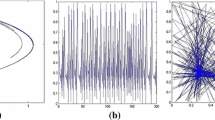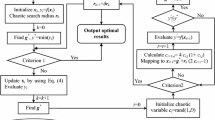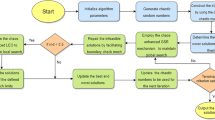Abstract
This paper combines the dynamically adjusting parameters, the chaos search (CS), and the modified simplex method (MS) with GAFSA, and the CS_MS_GAFSA is proposed. The algorithm speeds up the convergence by dynamically adjusting the parameters, and increases the probability of artificial fish esca** local extreme points by chaotic search for the current global optimum value. When the algorithm converges to the global optimum nearby, a simplex is constructed and the algorithm switches to MS which will continue to optimize until a certain stop condition is satisfied. Take the best point of simplex vertex at this time as the optimal value. The computational results on benchmark functions show that CS_MS_GAFSA does improve in optimizing accuracy and convergence speed.
Access this chapter
Tax calculation will be finalised at checkout
Purchases are for personal use only
Similar content being viewed by others
References
Li XL, Qian JX (2003) Studies on artificial fish swarm optimization algorithm based on decomposition and coordination techniques. J Circuits Syst 2(1):1–6 (in Chinese)
Jiang MY, Yuan DF (2012) Artificial fish swarm algorithm and its application. Science Press, Bei**g (in Chinese)
Jiang MY, Cheng YM, Yuan DF (2014) Improved artificial fish swarm algorithm, 5th edn
Ma XM, Liu N (2014) Improved artificial fish-swarm algorithm based on adaptive vision for solving the shortest path problem. J Commun 1, 35(1):1–6
Zhu KC, Jiang MY (2009) An improved artificial fish swarm algorithm based on chaotic search and feedback strategy. In: Proceedings of international conference on computational intelligence and software engineering (CISE), 2009, 1–4
Zhu KC, Jiang MY (2010) Quantum artificial fish swarm algorithm. In: Proceedings of the 8th world congress on intelligent control and automation, 2010, pp 1–5
Jiang MY, Cheng YM (2010) Simulated annealing artificial fish swarm algorithm. In: 8th world congress on intelligent control and automation, WCICA, 2010, pp 1590–1593
Zhang P, Wei P, Yu HY, Fei C (2012) Biogeography-based optimization algorithm by using chaotic search. J Univ Electron Sci Technol China 41(1):65–69
Liu H, Huang M, Huang D (2005) Survey on optimization method based on chaotic search and its developments. J Nan**g Univ Sci Technol 124–128
Bucolo M, Caponetto L Fortuna et al (2002) Does chaos work better than niose? IEEE Circuits Syst Mag 2(3):4–19
Yang XQ, Teo KL, Caccetta L (2001) Optimization methods and applications. Kluwer Academic Publishers, Boston
Rahnamayan S, Tizhoosh HR, Salama MMA (2008) Opposition-based differential evolution. IEEE Trans Evol Comput 12(1):64–79
Acknowledgments
This work was part of the program on The National Natural Science Foundation of China funded under the National Natural Science Fund Committee, grant number 61374198.
Author information
Authors and Affiliations
Corresponding author
Editor information
Editors and Affiliations
Rights and permissions
Copyright information
© 2015 Springer-Verlag Berlin Heidelberg
About this paper
Cite this paper
Peng, Pz., Yuan, J., Wang, Zj., Yu, Y., Jiang, M. (2015). An Improved GAFSA Based on Chaos Search and Modified Simplex Method. In: Deng, Z., Li, H. (eds) Proceedings of the 2015 Chinese Intelligent Automation Conference. Lecture Notes in Electrical Engineering, vol 336. Springer, Berlin, Heidelberg. https://doi.org/10.1007/978-3-662-46469-4_14
Download citation
DOI: https://doi.org/10.1007/978-3-662-46469-4_14
Published:
Publisher Name: Springer, Berlin, Heidelberg
Print ISBN: 978-3-662-46468-7
Online ISBN: 978-3-662-46469-4
eBook Packages: EngineeringEngineering (R0)




